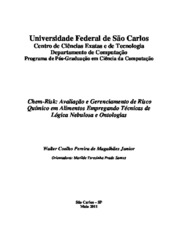Chem-risk: avaliação e gerenciamento de risco químico em alimentos empregando técnicas de lógica nebulosa e ontologias

Visualizar/
Data
2011-05-31Autor
Magalhães Junior, Walter Coelho Pereira de
Metadata
Mostrar registro completoResumo
This research presents the Chem-Risk approach which is applied to chemical food safety domain, in order to circumvent a problem often encountered: data with little semantic or presenting low quality results that lead to results of low quality, unreliable and therefore inadequate to the reality of domain analyzed. In response to this purpose, the approach creates a Flexible Base Platform to properly pre-process the results of laboratory tests in agricultural food, allowing so many other variables, here considered as food risk factors, are observed in this analysis. Managed by the platform, the concepts of fuzzy logic and ontologies enable the incorporation of new risk factors, improve data quality and produce a superior technical expertise to that offered by traditional approaches used in the context of Brazilian public policies that aim to assess chemical risks and maximize the chemical safety of agricultural food. Due to the complexity and scope required for the ontology, a new approach to ontological engineering is presented. Data mining techniques used here play a key role, helping government officials and experts to extract higher risk levels of non-trivial knowledge, from the superior knowledge provided by the incorporation of fuzzy logic and ontology during the preprocessing step. The results obtained in mining step reveal a more faithfully semantic to the reality of food chemical safety, complement this reality and increase the level of expertise in favor of non-trivial decisions. By the other hand, if there were no proper preprocessing at the semantic level, the results, although apparently correct, would be concealing its false basis and, and thus presenting results completely wrong before the reality of chemical safety of agricultural food worldwide. We believe that what makes our real case study more remarkable is that it helps to improve the health of global population and, by extension, save our own lives.